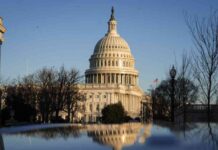President-elect Trump has selected Robert F. Kennedy Jr., an environmental lawyer and vaccine skeptic, as his choice to lead the Department of Health and Human Services. Trump made the announcement on Truth Social, expressing his belief that RFK Jr. will address the nation’s chronic disease crisis and reform health and science agencies.
Trump emphasized the need to protect Americans from harmful chemicals, pollutants, and other factors contributing to the health crisis in the country. The Senate will have the final say on RFK Jr.’s confirmation, with many Republicans reserving their opinions until they assess his qualifications for the role.
If confirmed, RFK Jr. will head an agency overseeing vaccines, medicines, research, public health infrastructure, and health care plans. The nomination has sparked controversy, with critics like Donna Shalala and health advocacy groups expressing concerns about his anti-vaccine views.
Despite his history of vaccine skepticism, RFK Jr. has garnered support from Trump and Republicans for his health agenda. He has pledged to reform federal health agencies and tackle corporate corruption in the sector. However, his proposed reforms and past statements have drawn criticism from health officials like Georges Benjamin and others.
RFK Jr.’s nomination could signal a shift in federal health policy, with potential changes to vaccine recommendations and legal protections for developers. While he has tempered his anti-vaccine rhetoric, his appointment raises questions about the future of public health institutions under his leadership.
Prominent figures in the “Make America Healthy Again” movement, like nutrition-focused doctor Casey Means, could also join the administration. GOP lawmakers have welcomed RFK Jr.’s nomination as a chance to reform public health agencies after the Covid-19 pandemic.
RFK Jr.’s background as an environmental advocate and legal experience will shape his approach to leading HHS. His controversial views on vaccines and plans for agency reforms will likely be scrutinized during the confirmation process. The nomination reflects Trump’s commitment to reshaping health policy and addressing public health challenges in the country.
In conclusion, RFK Jr.’s nomination has sparked debate and raised questions about the future of health care under the new administration. His selection signals a potential shift in health policy and priorities, with implications for vaccine regulation and public health initiatives. As the Senate considers his confirmation, stakeholders across the health care sector will closely monitor the developments surrounding his appointment.

















